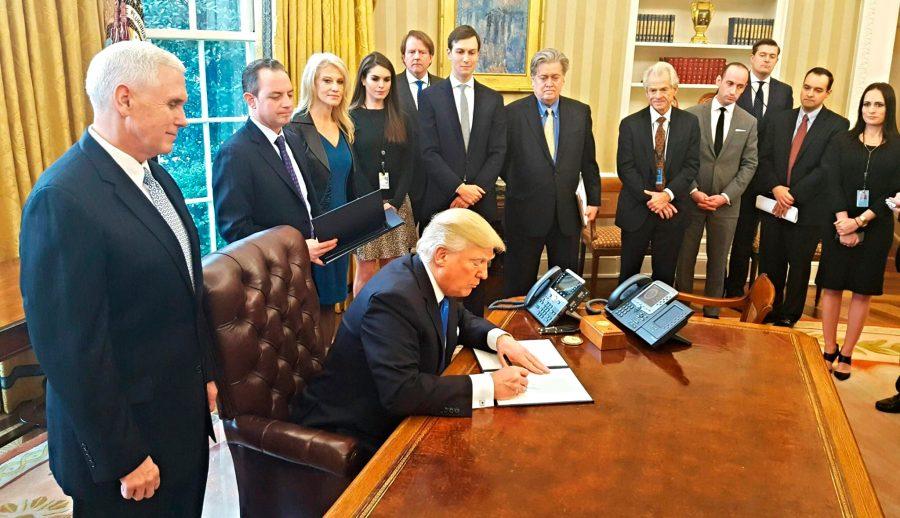Trump’s immigration and refugee ban felt in the Manchester area
February 8, 2017
Over the past week, there has been wide spread reaction to President Donald J. Trump’s new executive order banning travel and immigration of citizens from seven Muslim majority countries in the Middle East. The countries included are Iraq, Syria, Yemen, Sudan, Somalia, Libya, and Iran, and were highlighted by the Obama Administration as “countries of concern” in 2015. Following its signing on Friday, January 27th, every citizen from these countries will be banned from the United States for 90 days. Refugees will be banned for 120 days, and Syrian refugees will be banned indefinitely
After citizens learned that men and women were being detained due to this order, protests formed at airports around the country. The Boston Globe reported that a protest at Logan Airport was joined by Elizabeth Warren (MA). CNN reported a demonstration by Democrats outside the Supreme Court protesting the ban.
Senator Minority Leader Chuck Schumer (D) voiced his opposition to the new executive order. “These orders go against what America has always been about. The orders make us less humanitarian, less safe, less American,” Schumer said.
In response, President Trump said on Sunday, January 29th, “To be clear, this is not a Muslim ban… This is not about religion – this is about terror and keeping our country safe.” However, responses have opposed this notion as many citizens and some media outlets label this specifically a Muslim ban.
The new White House Press Secretary, Sean Spicer, addressed the executive order during a press briefing on January 30th. “This is about the safety of America, and there’s a reason that a majority of Americans agree with the president,” said Spicer. “They should understand it’s his number one priority.”
A Rueters/Ipsos poll, taken on Jan. 30-31, shows 31 percent of participants said the ban made them feel “more safe.” 26 percent said it made them feel “less safe,” while the remaining 33 percent stated it wouldn’t make a difference. A national telephone and online survey taken by Rasmussen Reports found that 57 percent of likely U.S. voters favor a temporary ban. The poll, published on January 30th, also found the 33 percent do not support a ban while 10 percent are undecided.
The immigration and refugee policy of the United States has specifically affected the Manchester area. Manchester is a designated refugee resettlement area. According to the New Hampshire Department of Health and Human Services, New Hampshire has been accepting refugees since the early 1980’s. The same department shows the state of New Hampshire has accepted 3,764 refugees since 2009. The city of Manchester has accepted 1,660 refugees since 2009, the most of any New Hampshire city.
Dan Forbes, the director of the Meelia Center for Community Engagement here at Saint Anselm College expressed his concern regarding the immigration and travel ban for both students, and the community of Manchester.
He believes that there is misinformation about the United States’ process of accepting refugees. “There is a perception that refugees are pouring over the border,” said Forbes. “But the United States has the strictest screening process of all countries accepting refugees. It takes over two years, and refugees are vetted by 12 government agencies.”
He also explained the different responses that have taken place from the community. “There is a large community in New Hampshire, agencies and churches that do amazing work. There’s one church that has given space to one of the English language programs for the last 10 to 15 years. It handed over the second floor of the church, five or six classrooms for virtually no rent, to run an English language class,” said Forbes. “Students here are involved in over 20 different organizations that directly help refugees relocated to the Manchester area.”
However, he went on to explain there have been some very negative responses to the refugees being resettled here. “They’re treated badly often times. There were two racist events the past week. A racist poster was left at both a middle school and an elementary school in Manchester where there is a very diverse group of students,” said Forbes. “There is an anti-immigration, anti-refugee sentiment in the country, so anyone who feels that way, feels a little more free to express that.”
Susan Gabert, director of Campus Ministry also commented on President Trump’s executive order. “There are mixed responses. I think it is time to come together and listen to one another better,” said Gabert. “As a department, we look to our Bishops, the Catholic Church, our Benedictine traditions, and the Gospel for guidance on how we treat one another.”
In a statement released to the college, President Steven DiSalvo said, “Saint Anselm College is an institution that values the contributions of our international students, faculty and staff deeply. We are committed to providing support and resources to those in need, and to upholding our mission and values of diversity and inclusiveness.”
While the nation reacts to President Trump’s executive order, refugees and immigrants in the Manchester area, and throughout the U.S., are the ones directly affected. These men, women, and children from the seven countries highlighted no longer have the ability to travel home and visit their homeland, family, and friends. This ban also eliminates the chances of others trying to settle in the U.S. from arriving anytime soon. It is still unknown what President Trump will do next at the end of the ban.
All of this is very new, and we will continue to see the extent of the effects of this executive order during the remainder of the time that it is still in place.



